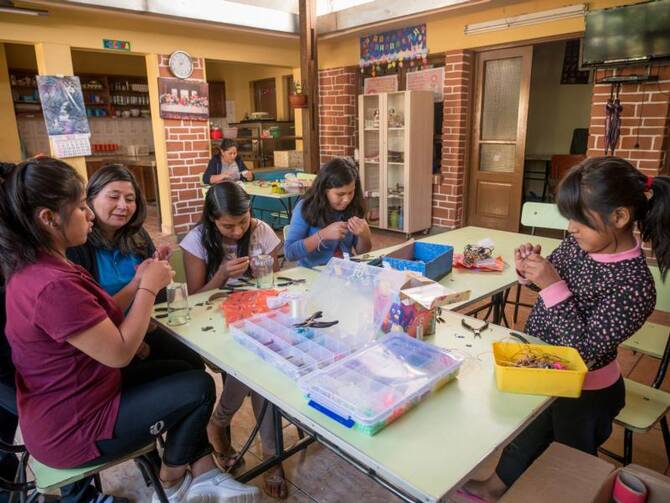COCHABAMBA, Bolivia (CNS) -- With a shy smile, Cecilia, 16, says she would like to be a petroleum engineer when she grows up. The Bolivian girl has good grades at school and looks forward to a bright future. However, Cecilia's life was not always joyful.
When she was 5, Cecilia -- not her real name -- was a victim of sexual abuse by her biological father. The incident was reported to the authorities, but the family didn't follow up on the case. When Cecilia was 12, her father abused her again. This time, she revealed the horrific experience to her teacher. Though her mother didn't believe her, the school reported the incident to the Child Welfare Agency.
Cecilia was brought to Hogar Nuestra Casa (Our Home) shelter for girls and adolescents who were victims of sexual abuse by a family member in and around Cochabamba.
Our Home shelter, supported by organizations such as the Maryknoll Fathers and Brothers, was founded in 2005 by a group of laywomen and Jesuit Father Arturo Moscoso to respond to a growing problem in Bolivia of violence against women, especially girls and adolescents.
The Bolivia Child Welfare Agency estimated that in 2014, there were 14,000 cases of rape of children and women nationally. Two years later, in 2016, the Special Police Force Against Violence reported that on average, every day, five women and children were victims of rape in Bolivia.
Our Home shelter not only provides a safe environment for girls 8 to 18 years, but also strives to reintegrate them into their families.
The staff at Our Home shelter seeks to empower the girls and adolescents with practical, psychological and emotional skills to assist them in reintegrating with their families or to strike out on their own if necessary.
The shelter, a one-story house in a residential area, has five bedrooms and can accommodate 15 girls. The house includes a library, offices, kitchen and dining room, where the girls eat, do homework and spend free time. Plans include building a multipurpose room to augment the tiny dining room space, where most of the activities now take place.
A typical day for the girls includes getting up early, doing household chores, going to school and doing homework. In their free time, they learn to dance, make costume jewelry, and other crafts. They also bake pastries, which they sell every Thursday outside the house to raise funds for the shelter, which provides for their needs, including medical care.
Cecilia was selected to be a leader at the shelter. She takes the younger girls to school and helps them with their homework and advises them on making right choices.
She also helps in the kitchen.
"I didn't know I had cooking skills, because it was normal for me to do that, but now I realize I do it well," she told Maryknoll magazine. "In my family, they used to tell me my defects and never how much they loved me, but here las tias (aunts) always appreciate what I do and express with words how much they love me."
The staff has been trying to work with Cecilia's mother and uncle to reunite them with Cecilia, but they are not yet able to take care of her. Her father has been sentenced to 30 years in prison for his crime.
"Once the girls arrive, we are responsible for them," said Janeth Vargas, administrative manager of the shelter. "So, we fulfill that paternal and maternal function that, at the moment, they don't have with their family. They teach you a lot; it's a constant learning."
In addition to the regular staff, Our Home shelter has four volunteer members on the board of directors, including Myrna Arebalo, administrator of the Maryknoll Mission Center for Latin America in Cochabamba. She brings students from the Maryknoll language program and short-term volunteer participants to help at the shelter.
"We need a lot of help. Of course, the ideal thing would be not to have these incidents, but we see that many girls lack opportunities and attention from their families and have immense suffering and trauma," Arebalo said.
Cecilia said she is grateful to have a new life.
"I was looking for the love of a family, and here I have found a new family that loves me and appreciates me as I am," she said. "I ask God for this home to be open to other girls like me. This is my home, and I do not want Our Home shelter to ever close."










